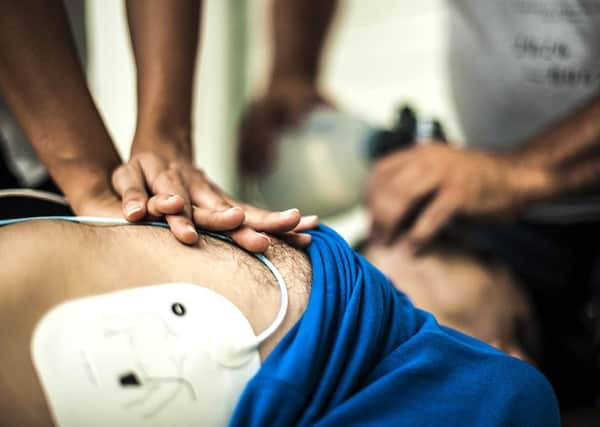FIRST AID: What to do when a loved one suffers a cardiac arrest


Up to seven out of 10 people who suffer a cardiac arrest could survive if they are treated with a defibrillator inside the first five minutes – but half of people in the south east have no idea where their nearest life-saving equipment is.
The shocking statistic is revealed as the first aid charity warns that despite more than 30,000 people experiencing cardiac arrests every year in the UK we are lagging way behind countries all over the world when it comes to knowing how to treat them.
The survey found:
Advertisement
Hide AdAdvertisement
Hide Adn 56 per cent of people in the region wouldn’t know what to do if faced with a cardiac arrest.
n While 80 per cent know what a defibrillator does, only 28 per cent say they’d feel confident using one – compared to 80 per cent of people saying they can use a smartphone with ease
n An astonishing 62 per cent wrongly believe it could cause harm to a patient.
With 80 per cent of out of hospital cardiac arrests occurring at home, St John Ambulance is announcing the launch of its C.A.R.E for a Heart campaign – four steps to learn in advance, to give you and your loved ones the best chance of survival:
Advertisement
Hide AdAdvertisement
Hide AdC Closest defibrillator – Find your closest defibrillator
A Arrest? Be ready to spot the signs of cardiac arrest
R Resuscitate – Know how to resuscitate using CPR
E Early defibrillation – Early defibrillation gives the best chance of survival
‘Our research shows that while most people have some awareness of defibrillators, we still have a long way to go in educating people about what they need to do in a cardiac emergency,’ said St John Ambulance regional director, Elizabeth Harper.
‘Home is where the heart is; it’s also where the majority of cardiac arrests happen, outside of hospital, which means it’s more likely to be our friends, family – or even ourselves – who need first aid in this life or death moment. ‘None of us want to find ourselves in a situation where we couldn’t save a loved one’s life, any more than we’d want them to stand by helpless if we suffered a cardiac arrest.
Advertisement
Hide AdAdvertisement
Hide Ad‘That’s why we are urging everybody to learn the four simple steps of C.A.R.E today – so that if the worst happens tomorrow, we can all act quickly and confidently, especially when every second counts.’
St John Ambulance has made simple, fun, and shareable videos, to help you learn the C.A.R.E steps, visit sja.org.uk/care to watch and share.